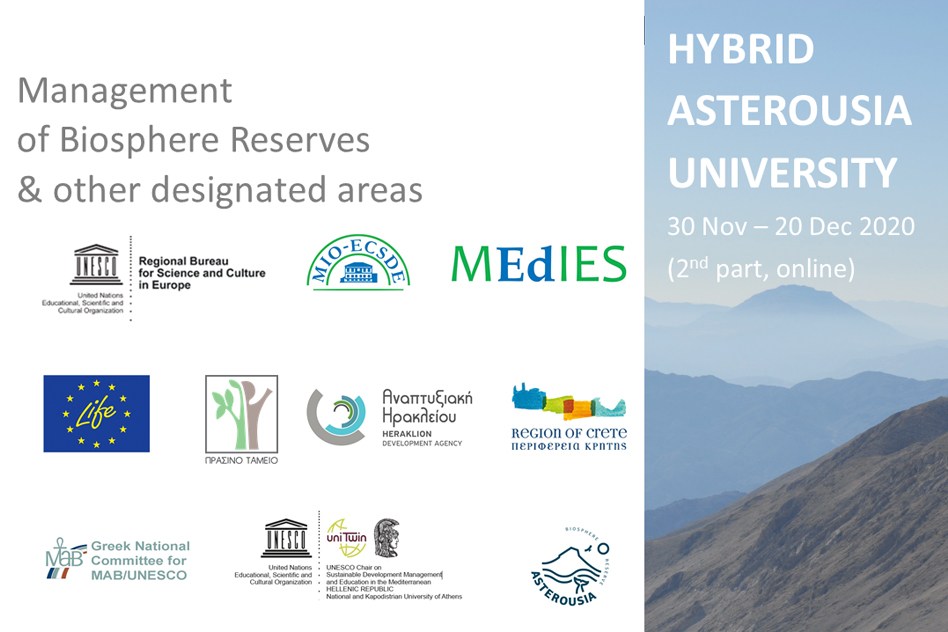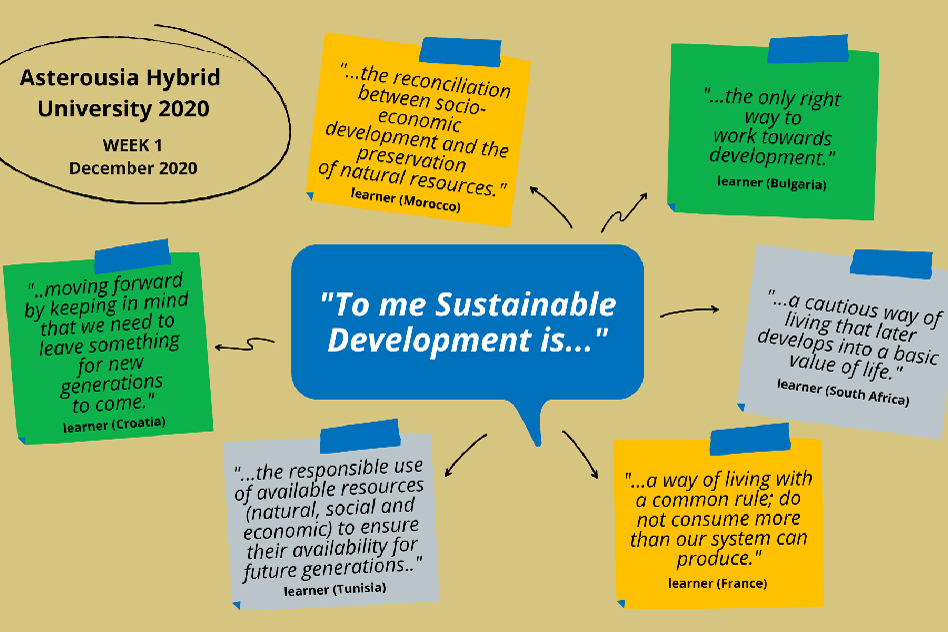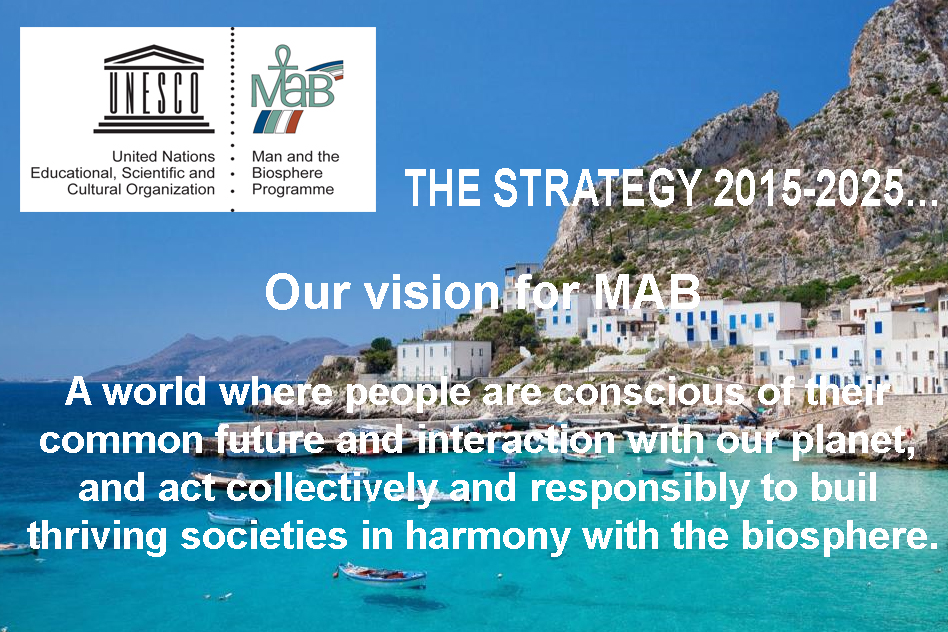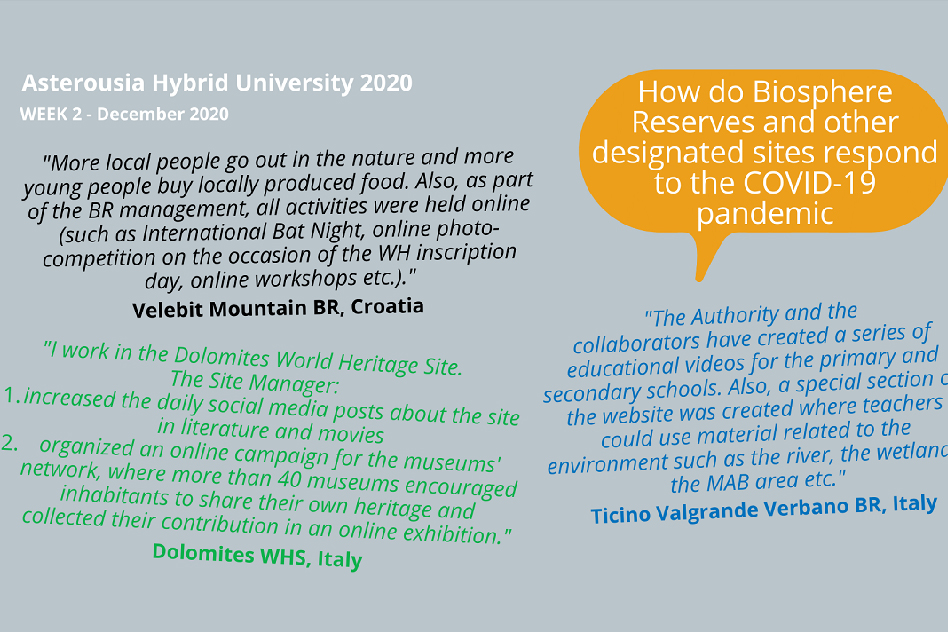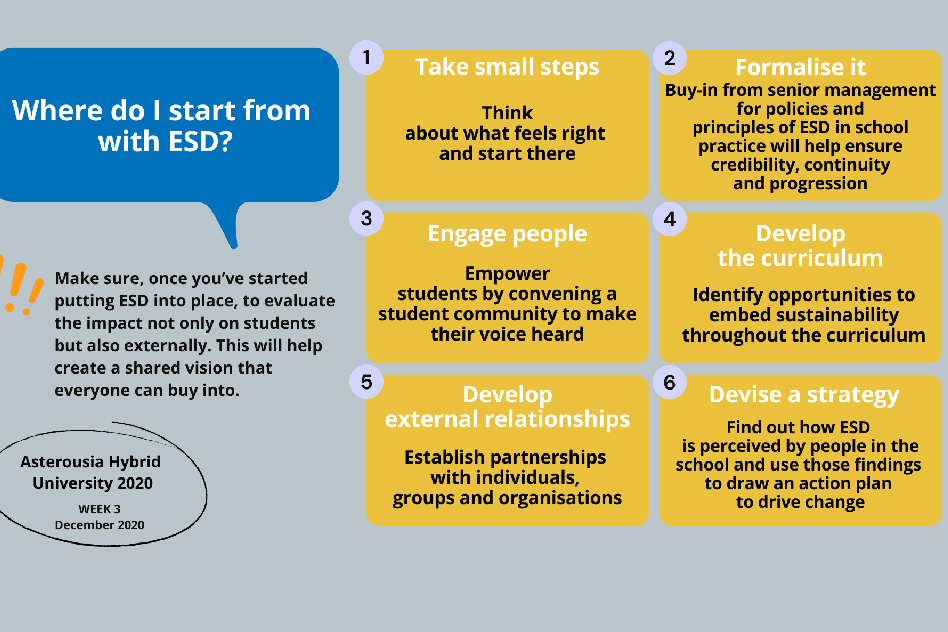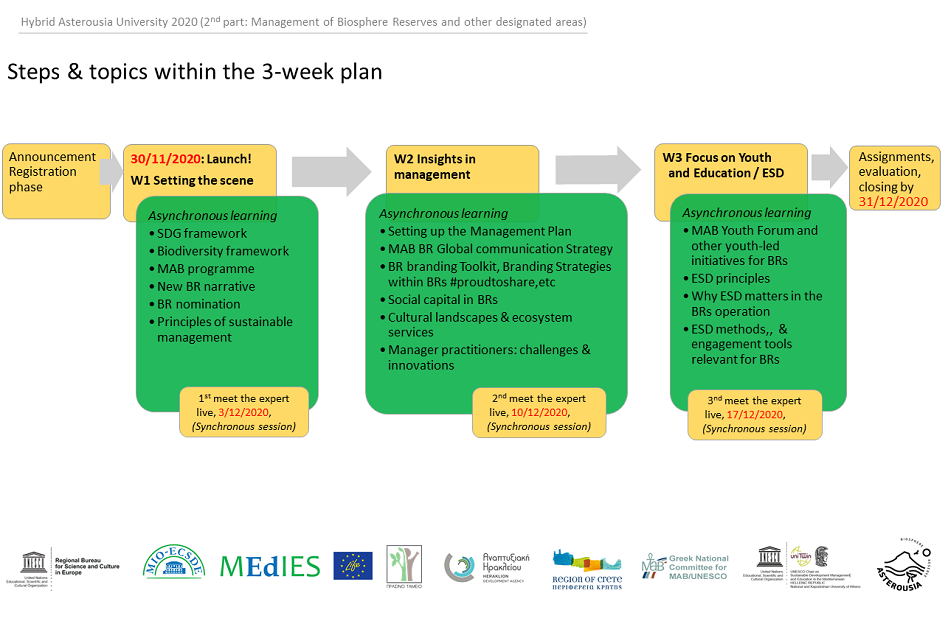The e-course entitled “Management of Biosphere Reserves and other designated areas” refers actually to the online component of the Asterousia Hybrid University.
The three-week long tutor-led e-course combined asynchronous and synchronous learning, covering the following thematic areas:
- Week 1 focused on the MAB Programme, the SDG frame and the EU Biodiversity Strategy for 2030;
- Week 2 focused on management, communication and branding of BRs;
- Week 3 was dedicated to Education for Sustainable Development (ESD) and innovative youth-led initiatives in BRs.
The e-course was attended by more than 200 participants from 48 countries, with 70% actively engaging with its content and 40% successfully completing all the course-work – a completion rate that is 4 times higher than an average MOOC rate completion, which is approx. 10%!
The topics were presented through a variety of means such as: video lectures of invited experts, articles and guidebooks, rich visual material from the Asterousia BR, as well as interactive exercises.
In addition, the learners had the opportunity to “meet-the-expert” of each Week in three live sessions (zoom meetings) with simultaneous translation English-French.
All video lectures as well as the recorded meet-the-expert sessions are available on the MIO-ECSDE Youtube Channel.
The momentum gained by the network and the positive results from the evaluation motivate the organisers to repeat it.
| The e-course in numbers: | |
| Applications (learners & trainers): | 197 (plus 13 late-comers) |
| Countries: | 48 |
| Never or once logged: | 67 |
| Active learners: | 148 |
| Trainers: | 21 |
| Assignments completed: | 87 |
| Certifications: | 85 |
| Meet the expert live meetings: | 3 (once a week) |
| Meet the expert attendants: | a) 95; b) 80; c) 64 |
| Evaluations Completed: | 74 |
The Asterousia Hybrid University was co-organised by the MIO-ECSDE/MEdIES Secretariat, the UNESCO Regional Office in Venice, the Heraklion Development Agency, the Prefecture of Crete, the Asterousia Management Committee, the UNESCO Chair and Network on Sustainable Development Management and Education in the Mediterranean, and the Greek National Committee for MAB/UNESCO, with the financial support of the LIFE Programme of the European Union (Operating Grant for NGOs) and the Green Fund of Greece.

Key lectures in e-course
Click on the speakers’ name to watch the video presentation.
Welcome messages
- Welcome message, Ana Luiza Massot Thompson-Flores;
- Welcome message, Miguel Clüsener–Godt;
- Welcome message, Ekaterini Tzitzikosta;
- Welcome message Theano Vrentzou – Skordalaki.
To me sustainable development is the only right way to work towards development. We should always seek the balance and should always think about all of the benefits and potential harms when making a decision for the future.
Week 1 lectures
- The MAB Programme of UNESCO (Jonathan Baker)
- A New Narrative for BRs within a COVID-19 context (Meriem Bouamrane)
- SDGs implementation in Biosphere Reserves (Jonathan Baker)
- The EU Biodiversity Strategy for 2030 (Patrick Wegerdt)
- Euro-Mediterranean Organisations of relevance: Julien Le Tellier (UNEP/MAP); Aravella Zachariou, UNECE ESD Mediterraean Committe; Mohamed Rejdali (COMPSUD)
- From environmental to sustainable development management (Michael Scoullos)
- Success factors in obtaining the status & operating a BR (Michael Scoullos)
- Asterousia, a new Biosphere Reserve in Crete (Amalia Tavladoraki)
- Meet the expert – Week 1.
Sustainable development is something that should already be integrated in every aspect of our life. Our actions should be driven by SD in order not to leave environmental footprints behind and to preserve our planet for future generations. However, in 2020, we are still discussing too much about the best way to achieve it, loosing precious time to really implement it.
Week 2 lectures
- The Management Plan of a BR (Michael Scoullos)
- Cultural landscapes and ecosystem services (Vasiliki Vlami)
- Social capital in isolated areas as a means to sustainable development-Part A (Colin Cambell)
- Social capital in isolated areas as a means to sustainable development-Part B/ Social capital in Asterousia BR (Vassilis Psallidas)
- Global Communication Strategy for MAB BRs (2018) (Meriem Bouamrane)
- Methodological approaches for BR branding (Filippo Lenzerini)
- Three ways to brand local products of BRs depending on the context (Filippo Lenzerini)
- Stories of specific BRs responding to the COVID-19 emergency (Filippo Lenzerini)
- Cases of sustainable businesses in Asterousia BR
- Innovative tools/projects from learners (Jimena Montane, Chokri Mansrour, Katrin Tomova)
- Meet the expert Week 2
In achieving the ESD vision, I find very important how to engage people, because without the engagement of people it is impossible to make changes towards sustainable learning and development. The challenge in this approach is how to motivate people to take action, and a practical way to overcome it is to be completely open and honest with people, to give them a chance to be creators of ideas, while respecting them, and at the same time showing them all the possibilities for development.
Week 3 lectures
- Evolution & concepts about ESD (Part I) (Michael Scoullos)
- Evolution & concepts about ESD (Part II) (Michael Scoullos)
- ESD and Biosphere Reserves (Michael Scoullos)
- The #ESDfor2030 framework (Bernard Combes)
- Youth and the MAB Programme (Jing Fang)
- The birth of an association (Laura Negri)
- Seeing my BR through new lenses (Chiara Torcianti)
- Stories from the Muro River, Slovenia (Simon Veberič)
- What does it take to organise a Summer University? (Katrin Tomova)
- At the UN Youth Climate Summit as the MAB Youth Delegate (Eirini Stogioudi)
- From Changbaishan, China to Asterousia, Greece (Dimitris Mavrogiannis)
- Meet the expert Week 3
A BR in itelf is a monument, a school that shows human history culture and environment. Within a BR education is appropriate the combination of knowledge and action. I believe that only theoretical approaches are easily forgot but with action in a place like BRs i think people will adopt sustainable living and practices and a specially to the primary sector.
BRs should be used as showcases for Sustainable Development. To achieve this it is necessary to involve the society (including youth) in the governance structure. Therefore, I think that learning to work with others is very important, especially in BRs like Asterousia with remote/isolated settlements.
BR sustainability is the most beautiful gift that young people today can leave for those who will come after us!
There is no sustainability if youth is not taken into account!
This e-course represents an inspiration source for my teaching techniques.
People are the most important heritage of the BR and we need to make sure that we involve them, we explain what the BR is and we work together with them because they’re the ones that are responsible for the future of their own region and for their own territory.
The challenges that are ahead of us: climate change and biodiversity loss and how the implementation of BR practices can answer to these challenges.
